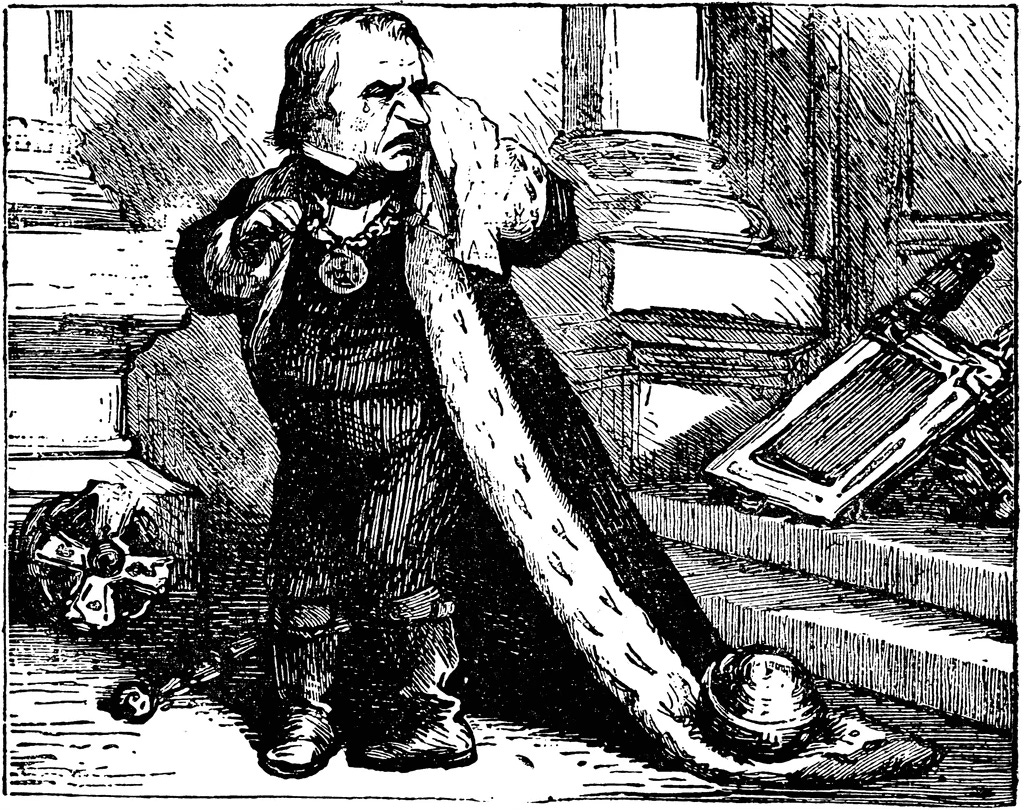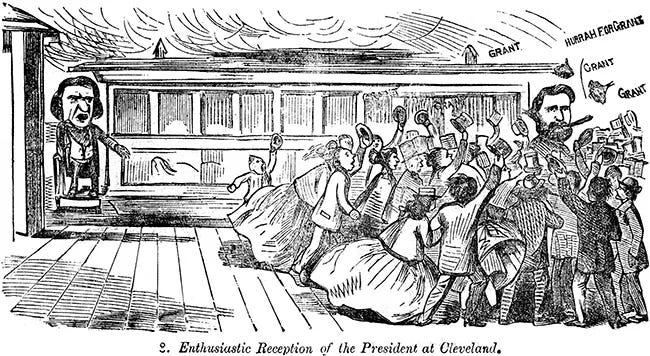We’re approaching June 14 and the grotesque, criminal spectacle of a decompensating wannabe dictator throwing a 45 million dollar birthday parade for himself at taxpayer expense. The hypocrisy of Republicans who are allowing this anti-democratic abomination is beyond comprehension. If ANY Democratic president had even brought up the suggestion of a display like this they would have been impeached, convicted, and removed from office by full bipartisan accord. I’m sickened beyond words at this monster and anyone who supports him – by word or by silence.
There will be massive nationwide protests and boycotts on NO KINGS DAY – here’s a website to find protests near you.
I have to confess, it’s been hard to focus on history when there is so much rising fascism to confront and resist on a daily basis.
But this parade horror has been making me think of the naked emperor’s predecessor, equally loathed by people of conscience: Andrew Johnson.
The similarities between the current lawless occupant of the White House and the unelected post-Civil War president Andrew Johnson are many. They are egregious chapters of US history.
See more here: Andrew Johnson Deconstructs Reconstruction
But Johnson’s narcissistic and ultimately disastrous “Swing Around the Circle” tour in 1866 was the beginning of the end of his presidency. (See why below, in Chapter 142). I hope the grotesque waste and indulgence of the felon’s parade will inspire the protests and conscience-awakening to bring about another timely end.
After the Gold Rush - Chapter 142
September 1866 - San Francisco, California
Mary Ellen Pleasant
Thomas had gone back to the mines. My boarding house on Stockton Street was almost complete, finished enough for me to move in. I created a secret room for myself, and I spent more and more time there, in front of an altar I made.
And I cursed Johnson.
I don’t mean swearing. I cursed him with my thoughts. I wished him humiliation, degradation and failure. I chanted for it. I visioned it. I whispered it.
“Make him stumble. Make him fall.”
And when he began his “Swing Around the Circle” tour, I wished for every person who attended or read of it to see the loathsomeness of the man.
The tour was launched to win support for Johnson’s Reconstruction policies that virtually handed the government of the South back to the traitors and slavers, and to promote his cronies in the midterm Congressional elections. It was named for the route that the campaign took: from Washington to New York, west to Chicago, south to St. Louis, and east through the Ohio River Valley back to the capital. Johnson had a train stocked full of politicians and generals, and a whole car full of press—but only “friendly” reporters were allowed to attend special events.
Now, presidents didn’t usually do political campaigning. It was thought undignified. But Johnson had an exaggerated faith in his own ability to speak. His advisors warned him to use a prepared speech, but he just couldn’t help himself. He got out in front of those crowds and spun out tales about his phenomenal rise from the tailor’s bench to the highest office of the land. He compared himself to the Lord Jesus Christ, and equated his pardon of Secesh traitors to Christ’s pardoning the sinners.
He had a couple of positively received rallies in the beginning, with friendly audiences of supporters.
Then he hit Cleveland.
The crowd was unruly from the start. Johnson was frequently interrupted by hisses and by angry cries. When he challenged listeners to “place a finger upon one act of mine…in violation of the Constitution,” the crowd roared “NEW ORLEANS!” to remind him of the massacre he’d condoned, only months before.
A heckler shouted, “Hang Jeff Davis!” and Johnson raged back, “Why don't you hang Thad Stevens and Wendell Phillips?” 1
Backstage, Johnson’s alarmed allies urged him to keep his dignity. Johnson shot back, “I don’t care about my dignity.”
Reporters heard every word, and these encounters were telegraphed over the country. Papers across the country reported the events in whole.
One paper called his speech “the most disgraceful ever delivered by any President of the United States.” The New York Times said its editors “greatly regretted” Johnson’s casual dismissal of his dignity. Another New York paper detailed “the mortifying spectacle of the President going about denouncing his opponents, bandying epithets with men in the crowd, and praising himself and his policies.”
Everyone around him knew he was committing political suicide.
General U.S. Grant had been pressured to accompany the cortege, but as the tour went on, Grant spent more and more of his time drinking himself into a stupor. At one point he told a reporter, “I am disgusted with this trip. I am disgusted at hearing a man make speeches on the way to his funeral.” Maybe he meant it to come out. Whether he did or not, the quote made the front page of the New York Herald.
In Detroit, Black waiters at the president’s hotel refused to serve Johnson’s party their breakfast, in protest against his obstruction of our civil rights. It was a grand moment.
I stopped by the offices of the Pacific Appeal that night, for the first time in a long time. I just wanted to be able to share that exhilaration with people who would understand.
Philip Bell was the only one in the office. When I saw him working there, alone, through the window, I stopped outside.
Of all the Executive Committee, he was not only the most irascible—he was the most openly hostile to my involvement in any Committee affairs. But at that moment he glanced up and out at me, straight into my eyes. And he nodded slowly.
I reached for the doorknob and pulled it open, to step inside.
“Good evening, Mrs. Pleasant,” he said softly.
I looked down at the desk, at the various editions of national papers spread out there. Of course they were all open to the reports of the Detroit waiters refusing to serve the president.
I turned my eyes back up. Bell was watching me. “A great day,” he said simply. “A great day.”
I didn’t stay after that. It was all that had to be said.
But when I stepped back out onto the dark street and started for home, I had a sudden sense of someone behind me, so strong that I thought Bell must have followed me out.
I turned—
And looked into the pale face and dark glasses of Baron Samedi. The Lord of Death himself, in top hat, overcoat and silver-knobbed cane. Regal lips… and jagged teeth.
My heart leaped up into my throat, and I froze—both unable to move and cold as the grave. I’d not seen Samedi—or any of the Loa—so manifestly since that afternoon so long ago in Congo Square.
He smiled at me. Slowly. A smile you don’t ever want to see.
And then he faded into shadow.
I gasped in a harsh, painful breath. It was a long time before my legs worked enough to take me home.
All that month I kept rushing out to get the papers every day, morning and night editions, too, to read about the Swing Around the Circle tour.
Johnson kept doing worse. And worse.
In St. Louis, he continued comparing himself to Jesus and accused Republicans of deliberately inciting the New Orleans Massacre. The next day a hostile Indianapolis crowd booed him off the stage and a street brawl broke out between his supporters and opponents. The fighting escalated to gunfire and one man was shot and killed. In other cities, audiences started chanting for Ulysses S. Grant and cheering for Congress.
Then in Pennsylvania, a crowd of four hundred people gathered to listen to Johnson’s speech on a platform built beside the railroad tracks. But as the crowd moved on to the temporary platform, it collapsed under the weight and the spectators fell twenty feet into a dry canal below.
Thirteen people died of their injuries that day.
Apparently Johnson asked to keep the train at the station to assist the injured, but it had to keep to its schedule, and the president’s party departed to the next stop, bringing him hostile criticism for abandoning the injured.
The “Swing Around the Circle” was an unmitigated disaster. Johnson hadn’t been all that well-known before the tour. Now he he’d been exposed to one and all as a monster.
It was what I’d asked for, no doubt. But that platform collapse haunted me, as did my nighttime visitation by implacable Samedi.
I decided that was enough of hexing. I decided to challenge the law instead.
All material © Alexandra Sokoloff
Read After the Gold Rush from the beginning:
Subscribe for more chapters:
Share this post:
After the Gold Rush is the epic story of the building of San Francisco as novelized history, told by the real people who built it, in their own words, from original source material such as newspapers, letters, court documents and the novels they wrote themselves.
Part 1 brings to life California’s rarely discussed Civil War and Reconstruction years. The characters are familiar American icons like Mark Twain, Governor Leland Stanford and mining baron George Hearst—and many more real historical figures who don’t happen to be straight white men but deserve to be equally well known.
California’s pioneers, dreamers, barons, immigrants, californios, civil rights leaders, villains. They knew each other, married each other, fought each other, and killed each other in “the most picturesque city, in the most romantic state, at the most dramatic moment in the history of the Republic.”
Why subscribe?
After the Gold Rush is currently available only online. Subscribe to get full access to all current chapters, photo and source material links, and the website.
Thaddeus Stevens and Wendell Phillips: prominent abolitionists who led the opposition to Johnson’s Reconstruction policies.
Thaddeus Stevens:
Member of the House of Representatives, chairman of the House Ways and Means Committee, initially was far more dedicated than Abraham Lincoln to emancipation and constantly pressed Lincoln and Congress to commit to total emancipation and a Constitutional amendment abolishing slavery. He was hailed as "the father of the 13th, 14th, and 15th Amendments."
Tommy Lee Jones played him brilliantly in the movie Lincoln, and really captured the moral passion of the real man. This is a great article for more reading.
"This is not a 'white man's Government'! ... To say so is political blasphemy, for it violates the fundamental principles of our gospel of liberty." - Thaddeus Stevens
Wendell Phillips:
Black attorney George Lewis Ruffin called Phillips "the one white American wholly color-blind and free from race prejudice.” He was a strong advocate for women’s rights and Native American rights and believed racial injustice was the source of all of society's ills.
“The experience of the fifty years...shows us the slaves trebling in numbers—slaveholders monopolizing the offices and dictating the policy of the Government—prostituting the strength and influence of the Nation to the support of slavery here and elsewhere—trampling on the rights of the free States, and making the courts of the country their tools. To continue this disastrous alliance longer is madness. The trial of fifty years only proves that it is impossible for free and slave States to unite on any terms, without all becoming partners in the guilt and responsible for the sin of slavery.” - Wendell Phillips







